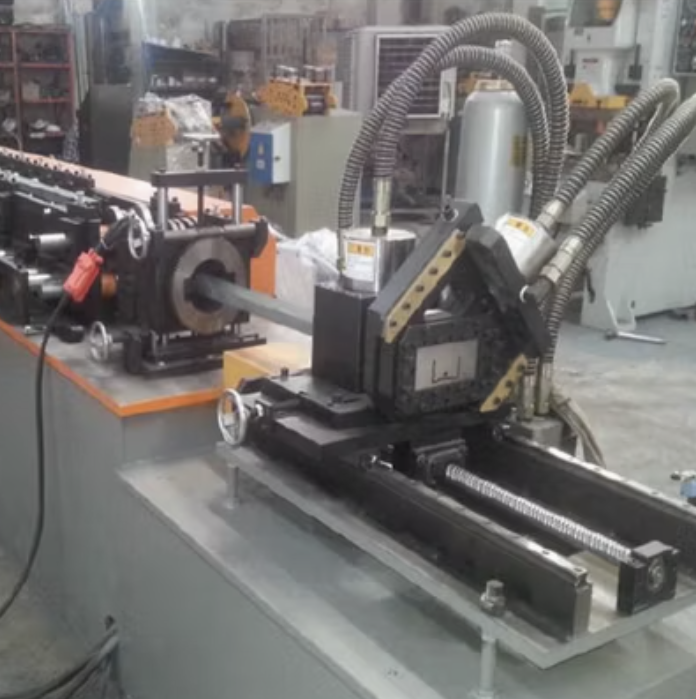To express an interest in this machine please submit the form below.

Not Sure What Machine You Need?
Select Your Profile, We'll Match It
Choose your desired profile drawing, and let Machine Matcher connect you with the best roll forming machine tailored to your needs.
Browse Profiles



Stud and track roll forming machines are specialized equipment designed to manufacture metal studs and tracks, which are essential framing components for partition walls, drywall systems, and lightweight steel structures. This type of machine is widely used in the construction industry to create a variety of shapes and sizes, offering flexibility for both commercial and residential building projects.
A stud and track roll forming machine consists of multiple roll stations that progressively shape flat metal sheets into studs or tracks, depending on the tooling setup. These machines are known for their precision, durability, and high efficiency, making them a popular choice for contractors and manufacturers in the construction sector. The machines can process a range of metals, including galvanized steel, aluminum, and other alloys, to create sturdy framing materials that meet industry standards.
The typical production speed can vary between 20 to 50 meters per minute, depending on the machine model and the material gauge. They are equipped with advanced PLC control systems, which allow operators to input precise dimensions, control the production process, and monitor machine functions in real-time. Many stud and track roll forming machines also feature automated cutting, punching, and notching systems, which enhance the efficiency and accuracy of the final products.
Here are the general specifications for a stud and track roll forming machine:
To ensure the longevity and optimal performance of a stud and track roll forming machine, regular maintenance is necessary. Key maintenance activities include:
Q1: What is the typical production speed of a stud and track roll forming machine?
A: Production speed generally ranges from 20 to 50 meters per minute, depending on factors like material thickness, machine model, and profile specifications.
Q2: What types of profiles can this machine produce?
A: The machine can produce a variety of stud and track profiles, including U-shaped, C-shaped, and customized profiles depending on the tooling setup.
Q3: Can the machine work with different metals?
A: Yes, stud and track roll forming machines can work with galvanized steel, aluminum, stainless steel, and other metal alloys, as long as they fall within the machine’s thickness capacity (typically 0.5 mm - 2.0 mm).
Q4: Is it possible to punch holes in the studs and tracks?
A: Yes, many stud and track roll forming machines have an optional hydraulic punching system that allows for pre-punched holes, which can be customized to fit the structural needs.
Q5: How user-friendly is the control system?
A: Most modern stud and track roll forming machines are equipped with a PLC control system that includes a touchscreen interface, making it easy for operators to set parameters, monitor production, and adjust settings quickly.
Q6: What kind of maintenance does the machine require?
A: Regular maintenance includes lubricating moving parts, inspecting the hydraulic system, cleaning metal debris, and ensuring the cutting blade remains sharp. Proper maintenance will enhance machine lifespan and production quality.
Q7: Can I adjust the machine for different profile sizes?
A: Yes, many models allow for adjustments in profile dimensions, and advanced models have automated setups to facilitate quick changes between different stud and track sizes.
Q8: What additional equipment may be required for full operation?
A: For a complete setup, you may consider additional equipment like an uncoiler, recoiler, stacker, and coil car. These add-ons streamline material handling, improve efficiency, and are especially useful for high-volume production.
Q9: How does the cutting system work?
A: The machine typically uses a hydraulic cutting system, which provides precise cuts and can be set up to cut the profile at exact intervals, allowing for consistent lengths as required.
Stud and track roll forming machines are essential for high-quality, efficient production of structural framing components in the construction industry. Their precision, durability, and ability to handle various metal types make them a versatile choice for manufacturers looking to streamline their production processes.
Copyright 2026 © Machine Matcher.